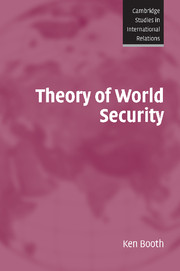7 - Business-as-usual
Published online by Cambridge University Press: 05 June 2012
Summary
His vision lay more in his brain than in his eye.
Émile Bernard, reputedly, about CézannePart II outlined a framework for a critical theory of world security. Part III is more empirical, attempting to show how aspects of such a theory might engage directly with major issues in world politics. The present chapter focuses on critique, going beyond problem-solving within the status quo, and instead engaging with several pressing problems of the status quo (the character of US global supremacy, the future of political violence, the politics of human security, and the state of nature). Critique takes on a more overtly political orientation in the chapter that follows, which develops the idea of emancipatory realism in relation to accessing knowledge, humanising globalisation, promoting equality, and nurturing human rights.
If we are to take seriously the injunction in chapter 1 to engage in ‘ceaseless exploration’, and to return to where we started and to ‘know it for the first time’, we must keep reminding ourselves that we need a differently thinking eye. Parts I and II emphasised the insecurity-inducing power of pre-defined questions and answers, and inherited common sense. Attempting to overcome this is an old challenge. The Enlightenment promised its supporters – and in so doing threatened the ancien régime – an ideal of social justice, a model of citizenship, and a cosmopolitan sensibility. Together, new theoretical commitments and political orientations sought to attack prejudice and privilege, whether based on wealth, gender, race, or birth.
- Type
- Chapter
- Information
- Theory of World Security , pp. 281 - 336Publisher: Cambridge University PressPrint publication year: 2007



